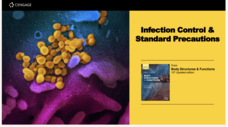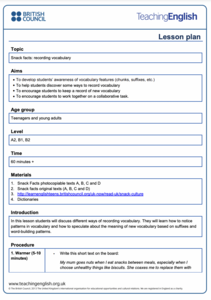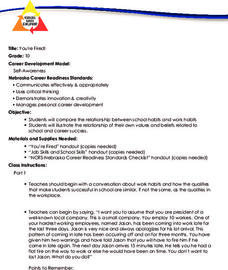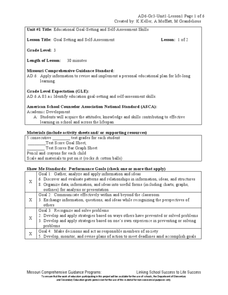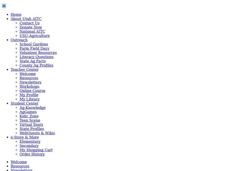College Board
2003 AP® Psychology Free-Response Questions
Intelligence testing can be a useful tool—but what are its limits? Scholars explore the question, considering issues such as the role of bias, using authentic College Board materials. Learners also examine the psychological factors...
College Board
2002 AP® Microeconomics Free-Response Questions
Inventors with patents have a distinct advantage in the market. But what happens when the patent expires? A series of questions from College Board asks learners to consider the effects of a patent expiration. Other practice prompts...
Longwood University
How Can We Help Maintain Our Water Supply? Conserving Water
Make young citizens aware of their environmental impact early. An inquiry-based lesson helps learners analyze their own water usage patterns and understand the effects of their habits. Individuals look at data to spot trends and see how...
Purdue University
Food Waste and the Environment
Out of sight out of mind can be a dangerous habit. Learners investigate the life of food waste after it leaves people's homes and its impact on the environment. They complete a series of three activities that involve building a mini...
American Museum of Natural History
A Whale of a Tale
What's the most interesting fact about a blue whale? Learners read an interview about the similarities between the Titanosaur and the blue whale displays at the American Museum of Natural History. Pupils learn not only about blue whales...
Constitutional Rights Foundation
Why Don’t More People in the U.S. Vote?
To vote or not to vote, that is the question. Secondary scholars explore voter turnout in the United States. The resource uses informational text, group discussion, and a worksheet to help academics understand hindrances to voting and...
Cengage Learning
Infection Control and Standard Precautions
With the number of COVID-19 cases rising dramatically, information about how standard precautions can be used to control infection is essential. The 16 slides in a presentation outline of how people need to change their daily habits to...
British Council
Buy. Use. Toss.
Responsible consumption is never a waste of time. Using the engaging resource, scholars learn about the impact of waste on the planet, sorting trash into necessary and luxury piles. They then analyze their consumption habits, writing an...
British Council
Snack Facts - Recording Vocabulary
What's in a word? Scholars look at a sentence written on the board about snacks. They discuss unfamiliar terms and then record the new words by drawing a picture, writing a synonym, writing a translation, or creating a mind map. Pupils...
Nebraska Department of Education
You're Fired!
Is willing to learn. Follows directions. Takes the initiative. The big idea in this career development lesson is that the work habits that make one successful in school are the same as those required to succeed in a career. Class members...
Curated OER
Circle of Life
Here is a well-designed science instructional activity that shows learners that everything that organisms do in ecosystems, including running, breathing, burrowing, growing, requires energy. After a thorough discussion of their own...
Curated OER
Tooth Truth
Getting in the habit of practicing good dental hygeine is important for youngters. This lesson reinforces the importance. Learners have a class discussion about how they take care of their teeth, then create toothbrush holders out of...
Curated OER
Wild Where?
Students investigate why the urban environment is considered a hostile environment; define the concept of endangered species; describe and identify a Peregrine Falcon; describe and identify the eating habits of the Peregrine Falcon.
Curated OER
Be a Food Detective
Learners explore how food is made and what are healthy and unhealthy eating habits. They participate in activities to further show them foods nutritional value.
Curated OER
Human Body Lessons
Students read "The Magic School Bus in the Human Body" and discuss the importance of maintaining a healthy body. They create a hinge and joint paper skeleton, follow the journey of a hamburger through the digestive tract, jump rope and...
Curated OER
Snack Smart, Move More
What do lowfat yogurt, baby carrots, fresh fruit, and rice cakes have in common? They are all healthy snacks that can be eaten daily. Investigate healthy eating/snacking guidelines, learn how to make lowfat ice cream and practice some...
Curated OER
Healthy Field Day
Hosting a Healthy Field Day will take a lot of planning and organization, but with a lot of parent participation it can come together very well. The resource describes seven stations of the ten that were presented. Each of these has a...
Curated OER
Goal Setting and Self-Assessment
Third graders review the importance of good study habits as a skill necessary for success in school. They focus on their goals and discuss how this would help to improve grades. They determine how much an F weighs their grade down.
Tennessee Pediatric Society Foundation
Commit to be Fit
Staying physically fit takes time, energy, and commitment...but it can also be a lot of fun! This list includes 11 simple ways to stay motivated to exercise and will help your young athletes commit to a life of fitness and healthy living...
Curated OER
Diving Whale Sculpture
Students identify two types of whales: toothed whales and baleen whales, and understand that whales come to the surface for air. Then they recognize that whales are mammals (they nurse their young and are warm-blooded). Students also...
Curated OER
Cover Up: Tools for Integrating Math and Engineering
Blend art, adolescent snacking habits, and math to create new cereal boxes. Secondary learners review scale drawings. They use this information to construct cereal boxes to scale and will compare their creation to the original product to...
Curated OER
Fable Writing - Interdisciplinary Approach to Social Sciences
Before writing their own fables, class members select an animal or insect to use in their story and research its character, habits, movements, etc. After reading a wide variety of fables and identifying the elements of a fable, writers...
Curated OER
Getting the Most Nutrition from Your Food
Healthy eating is a habit that one can never start too early. Learners in grades five through seven, work through a series of activities and informational reading to understand how to make good food choices. You'll find a full...
Curated OER
5 Components of Physical Fitness
Physical fitness is a vital part of maintaining our young scholars' health. This PowerPoint imparts the importance of physical fitness and the 5 components they need to understand in order to obtain a healthy body. This presentation is...
Other popular searches
- Habitats
- Animal Habitats
- Healthy Habits
- Animals and Their Habitats
- Habitat Diorama
- Healthy Lifestyle
- Pond Habitat
- Zoo Animals Habitats
- Feeding Habits
- Healthy Living
- Habits of Mind
- Desert Habitats








